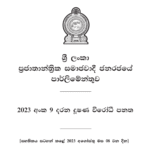1. Background of the Case
- Court: Supreme Court of Sri Lanka
Appeal No.: SC. CHC. Appeal 25/2011
Decision Date: 14 June 2024 - The Plaintiff-Appellant, Lakshman De Fonseka, filed an action to claim Rs. 45 million under a life insurance policy following the accidental death of his cousin, S.W.W.W.J.K.A.C. Goston (the “Insured”).
- The policy, effected in September 2004, promised Rs. 30 million for natural death and Rs. 45 million for accidental death.
- The Insured died four months later in a motor accident on 1 January 2005. Notably, despite having a living wife and mother, the Insured named his cousin (the Plaintiff) as the sole beneficiary.
- The Defendant-Respondent (Eagle Insurance Co. Ltd, now AIA Insurance) refused the claim, alleging misrepresentation and breach of the principle of uberrimae fidei (utmost good faith) in the insurance proposal.
2. Issues on Appeal
The Plaintiff raised two legal questions:
- Whether the High Court erred in holding that the Insured breached the duty of uberrimae fidei without sufficient proof.
- Whether the burden of proof was wrongly assigned, contrary to established principles that place this on the insurer.
3. Legal Principles Discussed
A. Uberrimae Fidei (Utmost Good Faith)
- Originating from Carter v. Boehm (1766), this principle requires full disclosure of all material facts by both parties, particularly the insured.
- The doctrine was applicable under English common law, which Sri Lanka follows in insurance law per Section 3 of the Civil Law Ordinance (1852).
B. Material Misrepresentation and Inducement
- A misrepresentation is material if it would influence a prudent insurer’s decision (Pan Atlantic v. Pine Top).
- The insurer must also prove actual inducement, i.e., that the misrepresentation caused them to enter into the contract.
C. Burden and Standard of Proof
- The burden lies on the insurer to prove fraudulent misrepresentation.
- The standard of proof in civil fraud cases must be commensurate with the seriousness of the allegation, requiring strong evidence but not proof beyond a reasonable doubt.
4. Key Findings
- The Insured falsely claimed an income of Rs. 2–3.6 million per annum and submitted a fraudulent letter from an auditor falsely linking his business to Polyfilms Ceylon Ltd.
- Contradictions in testimony by the Plaintiff about the Insured’s income and employment were numerous and stark.
- The insurer proved that the policy would not have been issued if the true financial status had been disclosed.
- Both High Court and Supreme Court found that the policy was obtained through fraud, breaching uberrimae fidei.
5. Court’s Conclusion
- The Supreme Court upheld the High Court’s ruling.
- It found no error in the conclusion that the Insured acted in breach of the principle of uberrimae fidei.
- Both legal questions raised by the Appellant were answered in the negative.
- The appeal was dismissed, and each party was ordered to bear its own costs.
6. Legal Significance
- The judgment reaffirms the continuing applicability of common law principles like uberrimae fidei in insurance cases in Sri Lanka, especially pre-2012 reforms in English law.
- It underscores the insurer’s right to avoid a contract where fraudulent misrepresentation is established and the importance of truthful disclosure in obtaining life insurance.
7. Implications
- Individuals must provide honest and accurate information in insurance proposals.
- Insurance companies are empowered to investigate suspicious claims and resist payouts if fraud is established.
- Courts will enforce the doctrine of utmost good faith stringently, especially where large sums and early deaths under new policies are involved.














